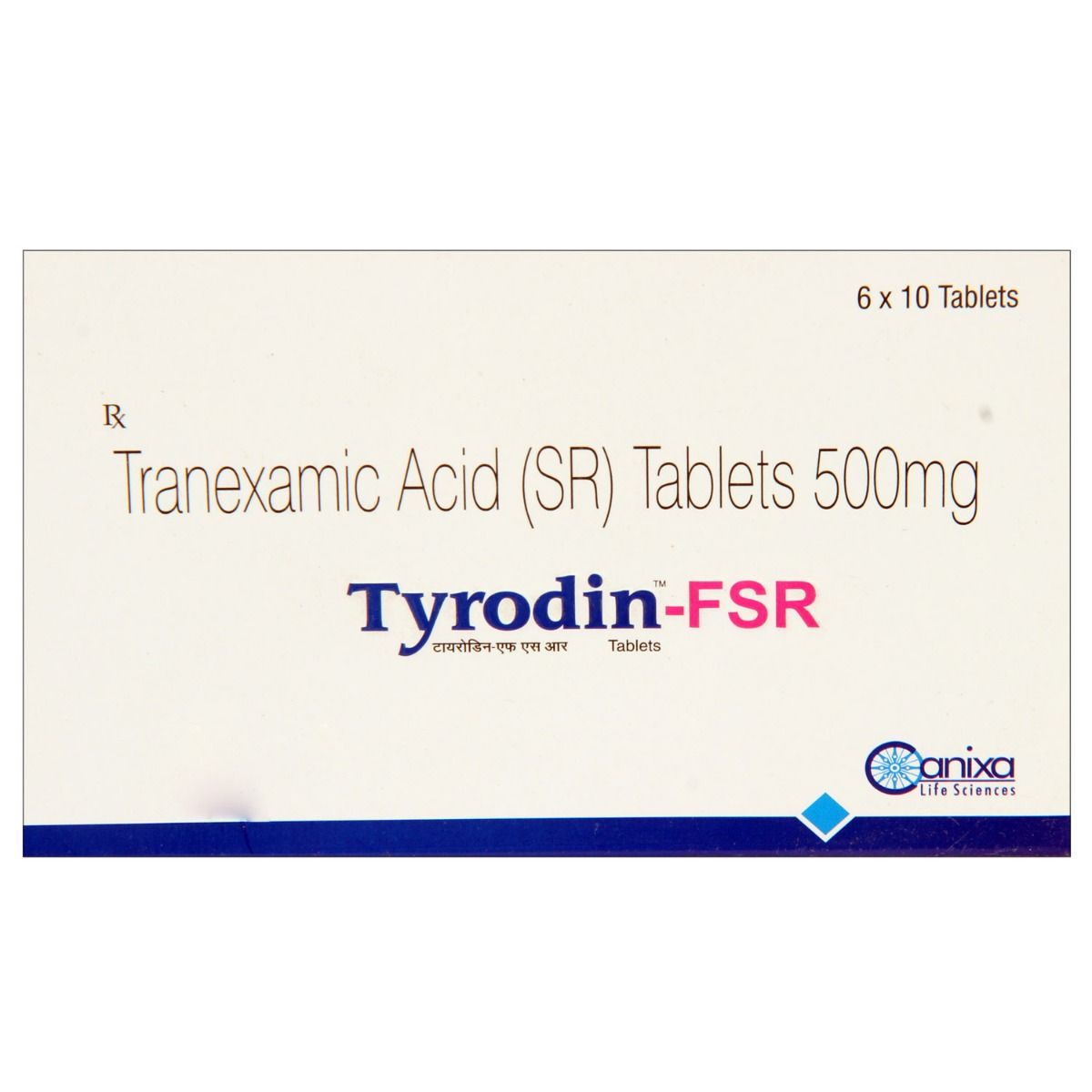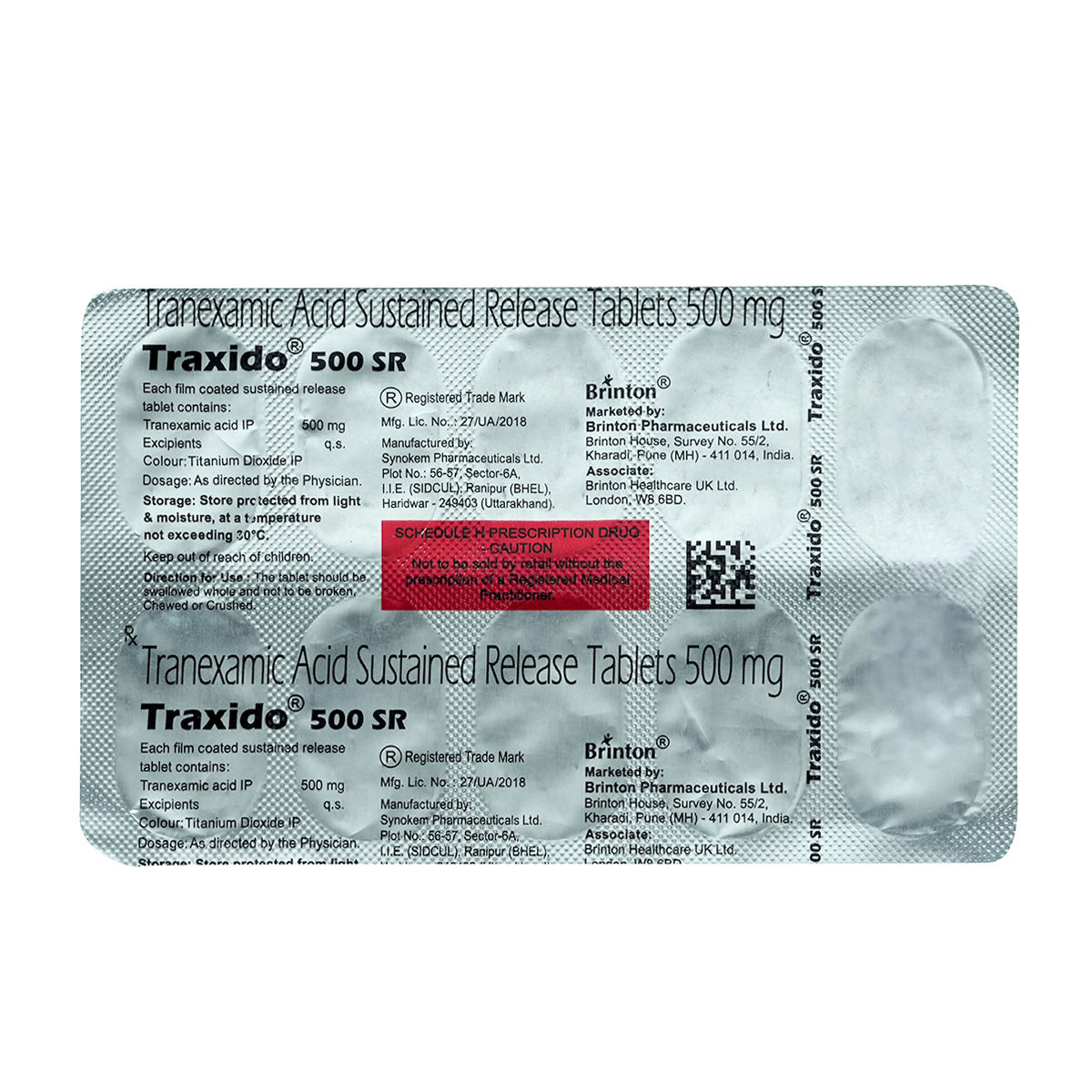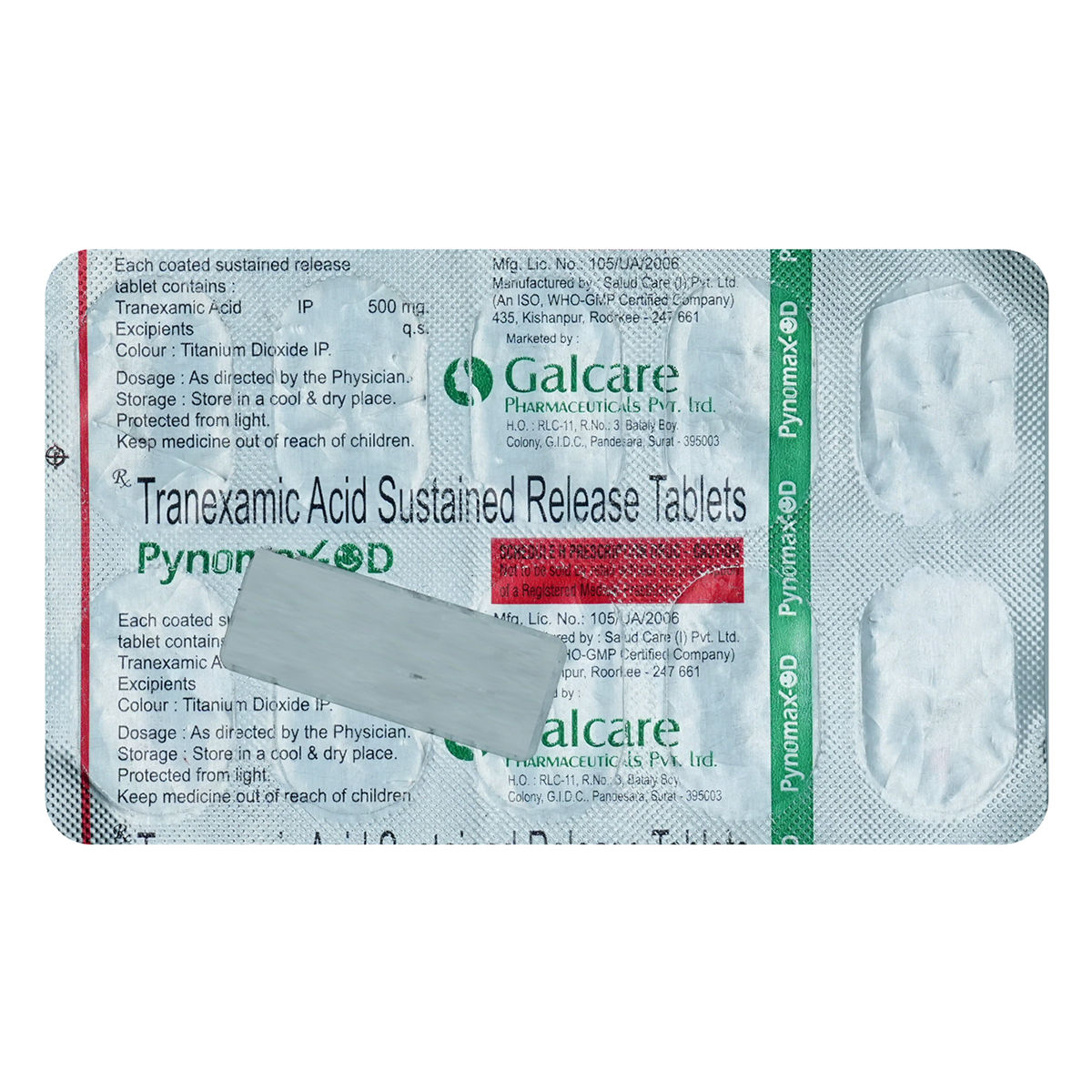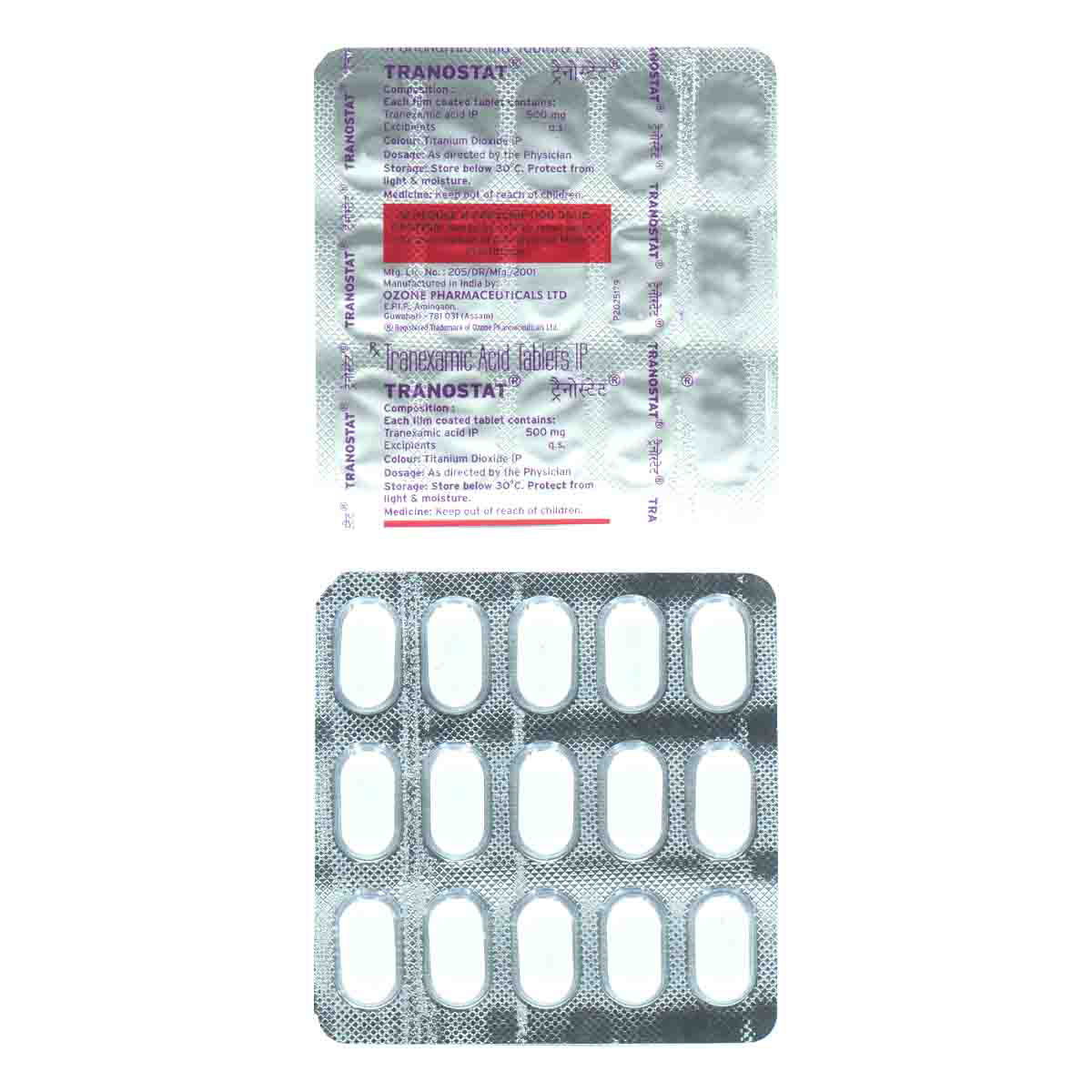Trapic Injection 1's
₹64.4*
MRP ₹71.5
10% off
₹60.77*
MRP ₹71.5
15% CB
₹10.73 cashback(15%)
Free Delivery
With Circle membership
(Inclusive of all Taxes)
This offer price is valid on orders above ₹800. Apply coupon PHARMA10/PHARMA18 (excluding restricted items)
Provide Delivery Location

Whats That

Secure Payment

India's Most Trusted Pharmacy

Genuine Products
Composition
Manufacturer/Marketer
Consume Type
Return Policy
Expires on or after
About Trapic Injection
Trapic Injection belongs to the class of medications called ‘anti-fibrinolytic drugs. It is mainly used to treat abnormal bleeding in various conditions such as menorrhagia (heavy bleeding in periods), epistaxis (nose bleeds), cervical surgery (conization of the cervix), post-prostatectomy (prostate surgery), post-cystectomy (bladder surgery), traumatic hyphaema (bleeding inside the eye), before tooth removal (dental extraction) in hemophiliacs (people who bleed more easily than normal) and a hereditary disease called angioneurotic oedema (HANO).
Trapic Injection contains an anti-fibrinolytic drug, tranexamic acid. Tranexamic acid helps the body's natural blood clotting system by reducing fibrin breakdown, which inhibits fibrinolysis, a process that limits the development of blood clots. As a result, Trapic Injection contributes to the prevention of excessive bleeding.
Trapic Injection is a parenteral form. It will be administered by the healthcare professional; do not self-administer. Trapic Injection may cause side effects such as feeling sick (nausea), diarrhoea, vomiting, itchy skin, and pain at the injection site. These side effects usually disappear with time. However, consult your doctor immediately if these side effects persist or if you develop any other serious side effects, such as vision problems while using Trapic Injection.
If you are allergic to Trapic Injection or any other medicines, please inform your doctor. Inform your doctor if you have pre-existing or a history of kidney disease, disseminated intravascular coagulation (a disease where blood clots form throughout your body), thrombosis (formation of blood clots in the blood vessels) or seizures (fits), as this medicine is not recommended in such cases. Also, inform your doctor before receiving this injection if you are using any birth control pills or fibrinolytic agents (medicines that dissolve blood clots) or if you are pregnant, planning pregnancy or breastfeeding.
Uses of Trapic Injection
Medicinal Benefits
Trapic Injection contains tranexamic acid, which is an anti-fibrinolytic medication. Tranexamic acid helps the body's natural blood clot process by preventing fibrin's breakdown, and this stops fibrinolysis, a process that stops blood clot formation. Thus Trapic Injection helps to prevent excessive bleeding.
Directions for Use
Storage
Side Effects of Trapic Injection
- Nausea
- Diarrhoea
- Itchy skin
- Pain at the injection site
- Injection site reactions
- Vomiting
Drug Warnings
Before administering Trapic Injection, inform your doctor if you notice blood in your urine (except during periods), or have a history of uncontrollable bleeding, disseminated intravascular coagulation (DIC) (a disease where blood clots form throughout your body), irregular periods and kidney disease. Also, inform your doctor if you or your family has a history of thrombosis (formation of blood clots in the blood vessels). Let your doctor know if you are taking medicine to treat a hereditary disease called angioneurotic oedema (HANO) every day for a long time. Your doctor may advise regular eye tests and blood tests to check your vision problems and also liver/kidney functioning. Inform your doctor if you are using birth control pills, including the patch, vaginal ring, and an intrauterine device (IUD), as there is a risk of deep vein thrombosis (a condition in which a blood clot is formed in the deeper vein, mostly the legs). Inform your doctor if you are using fibrinolytic agents (drugs that break blood clots) such as streptokinase, as they may stop the effect of Trapic Injection. Inform your doctor if you are pregnant, planning to become pregnant or breastfeeding.
Drug Interactions
Drug-drug interactions: Trapic Injection may interact with fibrinolytic drugs (streptokinase, urokinase, reteplase, alteplase, and tenecteplase, etc.), an antipsychotic drug (chlorpromazine), and a drug used to treat blood cancer (tretinoin) and progestins (levonorgestrel).
Drug-food interactions: No interactions found.
Drug-disease interactions: Trapic Injection interacts with various disease conditions, including colour vision defect, active intravascular clotting, intracranial haemorrhage, seizures (fits) and renal dysfunction.
Drug-Drug Interactions Checker List
- CHLORPROMAZINE
- TRETINOIN
- STREPTOKINASE
- UROKINASE
- LEVONORGESTREL
Habit Forming
Diet & Lifestyle Advise
- Follow a healthy diet. Include vegetables, fruits, and whole grains in your meals.
- Stay hydrated; drink plenty of water.
- Cut down on sugars, salts, spicy food, coffee, and alcohol.
- A heating pad can help ease the pain by placing it on the belly or lower back.
- Exercise can help ease the pain of menstrual cramps.
- Avoid stress by performing meditation or yoga.
- Massage your lower back or abdomen to relieve the pain.
- Take proper rest.
Disease/Condition Glossary
Menorrhagia: It is a condition characterized by heavy or prolonged bleeding during menstrual periods which last for more than seven days
Epistaxis: Bleeding from the nose when the blood vessels of the nose lining burst. This can occur due to dryness or nose injury.
Post-operative bleeding: It is bleeding after surgery due to the blood vessel rupture. Some people may experience mild to severe bleeding due to cuts made during surgery.
Traumatic hyphema: It is a condition characterized by the presence of blood in the anterior chamber of the eye due to a blunt injury. This condition may also result in vision loss.
Hereditary angioneurotic oedema (HANO): Hereditary angioneurotic oedema is a hereditary disease that causes recurrent painless swelling under the skin.
Alcohol
Caution
Trapic Injection may not interact with alcohol. However, avoid the consumption of alcohol as it may worsen your health condition.
Pregnancy
Caution
Trapic Injection should not be used when pregnancy unless clearly necessary. So, inform your doctor if you are pregnant or suspect pregnancy. Your doctor will weigh the benefits and potential risks before prescribing Trapic Injection.
Breast Feeding
Caution
Trapic Injection should not be used in nursing mothers unless clearly necessary. So, inform your doctor if you are a nursing mother. Your doctor will weigh the benefits and potential risks before prescribing Trapic Injection.
Driving
Caution
Trapic Injection does not affect your ability to drive or operate machinery. However, do not drive if you experience unwanted effects after taking Trapic Injection.
Liver
Caution
No information is available on the use of Trapic Injection in patients with liver problems. Inform your doctor if you have liver conditions. Your doctor may adjust the dose or prescribe a suitable alternative if needed based on your health condition.
Kidney
Caution
Trapic Injection should be used with caution in patients with kidney diseases. Inform your doctor if you have kidney conditions. Your doctor may adjust the dose or prescribe a suitable alternative if needed based on your health condition.
Children
Caution
Trapic Injection should be used in children below 12 years of age only if clinically needed. The dose will be decided by your doctor based on your child's age and condition.
Country of origin
Manufacturer/Marketer address
FAQs
Disclaimer
Product Substitutes
Reference
- https://reference.medscape.com/drug/cyklokapron-tranexamic-acid-injection-342087
- https://www.rxlist.com/consumer_tranexamic_acid__cyklokapron/drugs-condition.htm
- https://my.clevelandclinic.org/health/drugs/18560-tranexamic-acid-injection
- https://www.medsafe.govt.nz/profs/datasheet/t/tranexamicacidMedsurgeinj.pdf
- https://www.mayoclinic.org/drugs-supplements/tranexamic-acid-intravenous-route/side-effects/drg-20072465?p=1#:~:text=Tranexamic%20acid%20injection%20is%20used,as%20determined%20by%20your%20doctor.

















